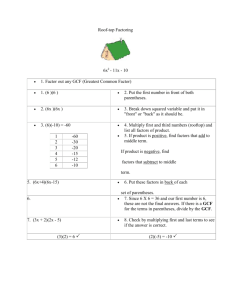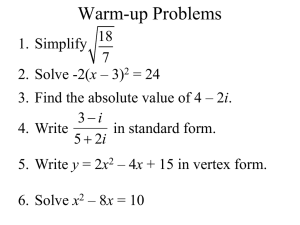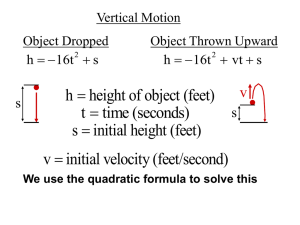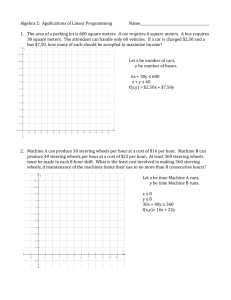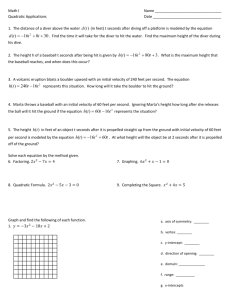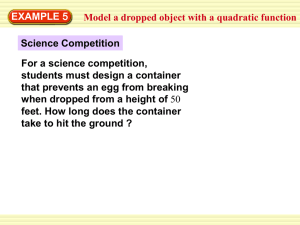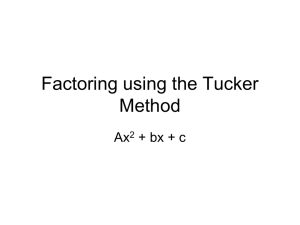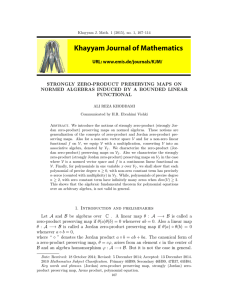I^JEI Solve Polynomial Equations in Factored Form
advertisement
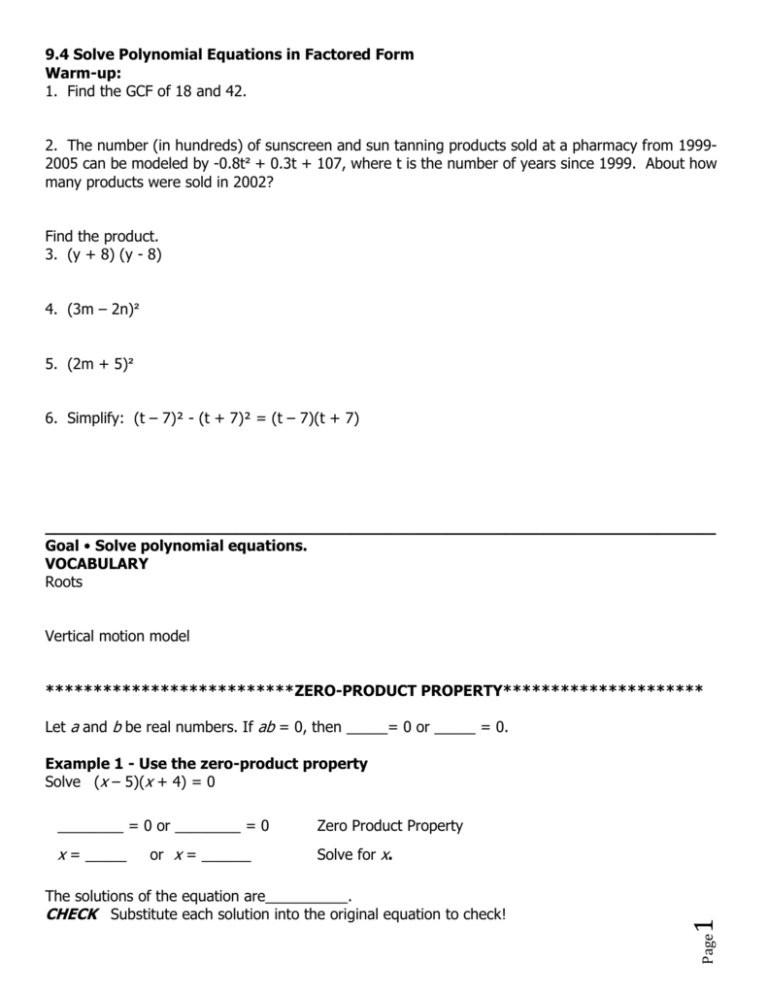
9.4 Solve Polynomial Equations in Factored Form Warm-up: 1. Find the GCF of 18 and 42. 2. The number (in hundreds) of sunscreen and sun tanning products sold at a pharmacy from 19992005 can be modeled by -0.8t² + 0.3t + 107, where t is the number of years since 1999. About how many products were sold in 2002? Find the product. 3. (y + 8) (y - 8) 4. (3m – 2n)² 5. (2m + 5)² 6. Simplify: (t – 7)² - (t + 7)² = (t – 7)(t + 7) ______________________________________________________________________ Goal • Solve polynomial equations. VOCABULARY Roots Vertical motion model **************************ZERO-PRODUCT PROPERTY********************* Let a and b be real numbers. If ab = 0, then _____= 0 or _____ = 0. Zero Product Property x = _____ Solve for x. or x = ______ The solutions of the equation are__________. CHECK Substitute each solution into the original equation to check! Page ________ = 0 or ________ = 0 1 Example 1 - Use the zero-product property Solve (x – 5)(x + 4) = 0 Example 2 - Find the greatest common monomial factor Factor out the greatest common monomial factor: a. 16x + 40y The GCF of 16 and 40 is ___________. The variables x and y have______________________________________________ so, the greatest common monomial factor of the terms is _______ 16x + 40y = b. 6x 2 + 30x 3 The GCF of 6 and 30 is ____________. The GCF of x 2 and x 3 is __________. So, the greatest common monomial factor of the terms is ___________. 6x 2 + 30x 3 = Example 3 - Solve an equation by factoring and using the zero product property Solve the equation. 3x 2 + 15x = 0 Original equation ________________ = 0 Factor out left side for any common factors. ___________ = 0 or __________ = 0 Zero-product property x = ____ or x = ____ Solve for x. The solutions of the equation are___________. Example 4 - Solve an equation by factoring and using the zero product property Factor left side. Zero-product property Solve for 6. The solutions of the equation are _________________ To use the zero product property, you must write the equation so that one side is 0!!!! 2 ____________________ = 0 ___________ = 0 or ________ = 0 b = ____ or b = ____ Original equation Subtract ______ from each side Page 9b 2 = 24b ___________ = 0 Guided Practice Solve the equation. 1. (x + 6)(x – 3) = 0 2. (x – 8)(x – 5) = 0 Factor. 3. 10x 2y – 24y 4. 3t 6 + 8t 2 4 Factor and solve: 5. d 2 -7d = 0 6. 8b 2 = 2b VERTICAL MOTION MODEL The height h (in feet) of a projectile can be modeled by h = –16t 2 + vt + s where t is the ________________________ (in seconds) the object as been in the air , v is the __________________________________ (in feet per second), and s in the _____________________________(in feet). The height h (in meters) of a projectile can be modeled by h = –9.8t 2 + vt + s where t is the ____________ (in seconds) the object as been in the air , The Vertical motion model takes into account the effect of gravity but ignores other, less significant, factors such as air resistance. v is the ______________ (in meters per second), Page 3 and s in the ________________(in meters). Example 4 - Solve a multi-step problem Fountain A fountain sprays water into the air with an initial vertical velocity of 20 feet per second. After how many seconds does it land on the ground? Step 1 Write a model for the water’s height above ground. h = –16t 2 + vt + s Vertical motion model FOR FEET. h = –16t 2 +_____t + _____ v = ________and s = ________ h = –16t 2 + _____ Simplify. Step 2 Substitute _____ for h. When the water lands in the ground, its height above the ground is _____________ feet. Solve for t. ____ = –16t 2 + ____ Substitute _____ for h. ____ = ___________ Factor right side. _____ or ___________ Zero-product property ____ or ____________ Solve for t. The water lands on the ground _______ seconds after it is sprayed. The solution t = 0 means that before the water is sprayed, Page 4 Guided Practice. 7. What If? In Example 4, suppose the initial vertical velocity is 19.6 meters per second. After how many seconds does the water land on the ground?
